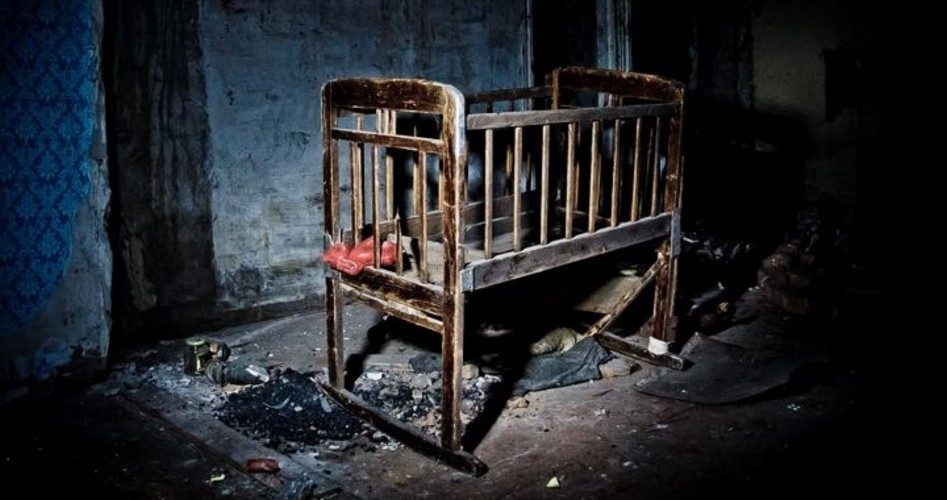
What do you call a movement ensuring that fewer leftists will procreate (other than a prescription for societal health)? In the case in question here, it’s called “BirthStrike,” a female-led organization for people who’ve resolved not to have children because of, as they put it, the coming “climate breakdown and civilisation collapse.”
As The Guardian reports:
As soon as Blythe Pepino got together with her partner Joshua two years ago, she felt “this overwhelming urge to create a family with him”, she says. “I think it was the fifth day after having met him, I said: ‘I’ve got to meet your parents.’ He was like: ‘You’re mad.’”
Then, late last year, she attended a lecture held by the direct action group Extinction Rebellion, which set out starkly the catastrophic reality of the changing climate. That galvanised Pepino, an activist and musician (she is the former singer of Vaults, now Mesadorm), to do research of her own and, eventually, to have a series of sad conversations with Joshua.
“I realised that even though I wanted to have a family at that point, I couldn’t really bring myself to do it,” she says. “I had to say to him: ‘I don’t know if I can do this, considering what we know — if there isn’t a political will to fix this, we really don’t stand much of a chance.’”
Pepino, who turns 33 today, found that other women — especially those in climate-conscious circles — were struggling with the same question, but were “too afraid to talk about it” for fear of judgment or ridicule. The US congresswoman Alexandria Ocasio-Cortez gave voice to their concerns last month, pointing to the increasingly dire scientific consensus and widespread government inaction: “It does lead young people to have a legitimate question: is it OK still to have children?”
So Pepino had an emotional reaction creating an overwhelming urge to have children with a man she’d just met, then another emotional reaction trumping that after a lecture she’d just attended — the latter catalyzed by misconceptions. An appearance she made on yesterday’s Fox News show Tucker Carlson Tonight evidences this (video below).
What’s sad is that Pepino is making a major life decision based on these misconceptions, as reflected in her claim that “99 percent” of scientists (the actual propaganda figure is 97 percent) embrace the anthropogenic climate-change thesis. In reality, a recently released peer-reviewed study tells us that the vast majority of Albertan geoscientists and engineers have varying degrees of doubt about the AGW thesis. Even more significant is that the 97-percent figure was actually debunked long ago, as The New American has reported.
One scientist who certainly occupies the climate-realist camp is professor emeritus of physics Harold “Hal” Lewis of the University of California at Santa Barbara. Upon resigning from the American Physical Society (APS) in 2016, he noted how “Dwight Eisenhower warned a half-century ago” of money corrupting science. He lamented “the global warming scam, with the (literally) trillions of dollars driving it, that has corrupted so many scientists, and has carried APS before it like a rogue wave.”
“It is the greatest and most successful pseudoscientific fraud I have seen in my long life as a physicist,” he continued.
I won’t again cite the evidence for this claim, as you can read it here, here, here, here, here, and here. But do note that ex-president of Greenpeace Canada Patrick Moore echoed Lewis just yesterday. Appearing on Fox & Friends, he bluntly stated, “The whole climate crisis is not only Fake News; it’s Fake Science. There is no climate crisis; there’s weather and climate all around the world, and in fact carbon dioxide is the main building block of all life.” Below is a video of Moore discussing the issue on Hannity last week (relevant portion begins at 1:10).
This is, in so many words, occasionally admitted by climate alarmists, too. Some say a good example is Ottmar Edenhofer, former UN Intergovernmental Panel on Climate Change official. He said in 2010, “One has to free oneself from the illusion that international climate policy is environmental policy. This has almost nothing to do with the environmental policy anymore, with problems such as deforestation or the ozone hole.”
Instead, he said, the goal of climate policy is to “redistribute de facto the world’s wealth.”
Despite this, Pepino still has plenty of company, with a recent survey finding that 38 percent of 18 to 29-year-old Americans believe climate-change risks should influence a couple’s decision to have children. This is sad, and it reflects a lack of perspective common — especially among the young.
It’s ironic, but we today have far better lives than our ancestors, yet nonetheless feel more hesitant to bring lives forth. Consider what worries were common for most of history: barbarians raiding your town and killing your family; an epidemic (e.g., the Plague) wiping out your village; high rates of infant mortality and death from childhood disease; being enslaved; starvation caused by crop failure; and, in general, lives relatively short, brutal, and tough. Yet people still had children.
Of course, critics may cite the one worry our ancestors didn’t have: that procreating would “endanger the Earth.” People thus troubled should, however, read Dr. Walter E. Williams 2008 article “Environmentalists’ Wild Predictions.” An excerpt:
At the first Earth Day celebration, in 1969, environmentalist Nigel Calder warned, “The threat of a new ice age must now stand alongside nuclear war as a likely source of wholesale death and misery for mankind.” C.C. Wallen of the World Meteorological Organization said, “The cooling since 1940 has been large enough and consistent enough that it will not soon be reversed.” In 1968, Professor Paul Ehrlich, Vice President Gore’s hero and mentor, predicted there would be a major food shortage in the U.S. and “in the 1970s … hundreds of millions of people are going to starve to death.” Ehrlich forecasted that 65 million Americans would die of starvation between 1980 and 1989, and by 1999 the U.S. population would have declined to 22.6 million. Ehrlich’s predictions about England were gloomier: “If I were a gambler, I would take even money that England will not exist in the year 2000.”
Add to this that climate alarmists’ computer-model temperature predictions have been consistently wrong. Then ask a question: Would I take stock advice from a broker with this track record?
Okay, now, should you make major life decisions based on doomsayers with this track record?
In reality, there’s one kind of disaster you probably never have to worry about: The one virtually everyone else is worrying about.
After all, did the majority foresee the Roman Empire’s collapse, the destruction of Pompeii, the Black Plague, the Great Depression, or WWII? History teaches that disaster will come, but always as something unexpected to most, like a thief in the night.
In the meantime, live your life, for we don’t truly know what tomorrow brings. But I do have my own prediction: In 40 years, Pepino and her BirthStrike sisters may deeply regret not having had children. For the climate con too shall pass, but so will their youth — and you don’t get a do-over.
Photo: Vladimir Zapletin / iStock / Getty Images Plus


